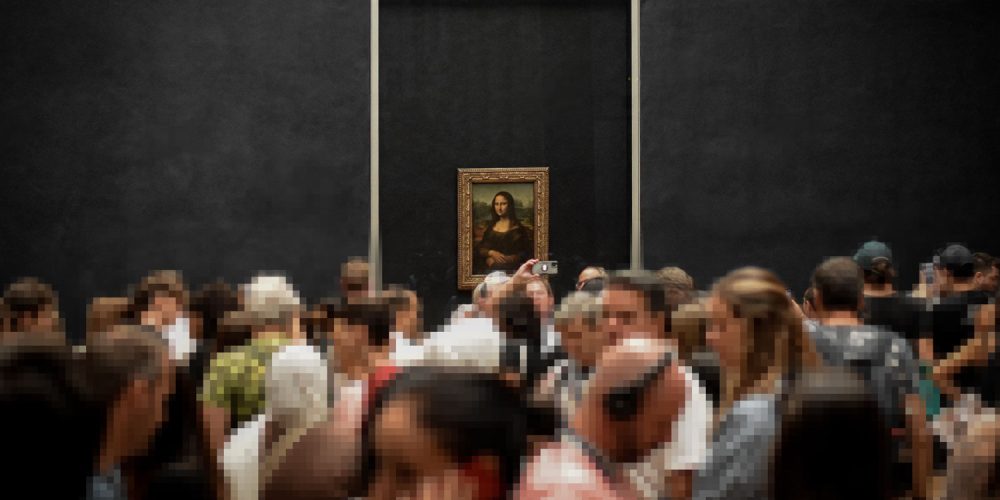
The Mona Lisa is one of the most famous and iconic paintings in the world, created by the Italian Renaissance artist Leonardo da Vinci. The painting is also known as “La Gioconda” or “La Joconde” in Italian and French, respectively. It is believed to have been painted between 1503 and 1506, with some suggesting that da Vinci may have continued working on it until 1517.
The Mona Lisa is renowned for several reasons:
Enigmatic Smile:
The subject of the painting, Lisa Gherardini, has a subtle and enigmatic smile that has intrigued viewers for centuries. Her expression appears to change depending on how you look at the painting, giving it an almost lifelike quality.
Lisa Gherardini, also known as Lisa del Giocondo, is widely believed to be the woman depicted in Leonardo da Vinci’s famous painting, the “Mona Lisa.” She was the wife of Florentine merchant Francesco del Giocondo, and it is thought that Leonardo painted her portrait between 1503 and 1506. The identity of the sitter in the painting has been the subject of much historical and art historical speculation. While it is not absolutely confirmed that Lisa Gherardini is the model for the Mona Lisa, many art historians consider her to be the most likely candidate.
Use of sfumato:
Leonardo da Vinci employed a technique called “sfumato,” which involves the use of soft transitions between colors and tones. This technique gives the painting a hazy and dream-like quality.
Composition:
The composition of the painting, with Lisa positioned against a distant landscape and a winding river, adds depth and perspective to the work. The use of atmospheric perspective is also notable, making the background gradually fade into the distance.
Theft and Recovery:
The Mona Lisa has had a tumultuous history, including being stolen from the Louvre Museum in 1911. It was missing for two years before being recovered in 1913. This incident only added to the painting’s fame.
Display at the Louvre:
The Mona Lisa is currently displayed at the Louvre Museum in Paris, France. It is housed in a climate-controlled, bulletproof glass case to protect it from damage and theft.
Cultural Impact:
The Mona Lisa has had a profound influence on art and culture, serving as a symbol of beauty and mystery. It has been referenced and parodied in various forms of media and is considered a masterpiece of Renaissance art.
The painting’s small size (77 cm × 53 cm or 30 in × 20.87 in) and its historical significance have made it a must-see for art enthusiasts and tourists from around the world. It continues to be a subject of fascination and scholarly study, and its allure remains as strong as ever.
Depending on the organisator, the duration and the quality of your guide you can book for different prices. WeGoTrip sells audio guides with or without ticket. if you bought an audio guide without ticket the choice is up to you where you will buy your ticket. Here are some possibilities to book online:
| Activity name | Price | QR code |
|---|---|---|
| Skip-the-line Louvre Ticket with Host for Mona Lisa – 50% OFF Getyourguide |
 |
|
| Paris: Louvre Masterpieces Tour with Pre-Reserved Tickets Getyourguide |
 |
|
| Paris: Louvre Museum Ticket and Mona Lisa Access with Host Getyourguide |
 |
|
| Louvre Museum: Priority Entry + Direct Access to Mona Lisa Ticket Tiquets ENGLISH – MUSEUM ONLY |
||
| Louvre Museum In-App Tour: Masterpieces of Civilization (WITHOUT A TICKET) WeGoTicket |
 |
|
| Louvre Museum In-App Tour with a Ticket: Masterpieces of Civilization WeGoTicket |
 |

The Mona Lisa by Leonardo da Vinci is one of the most famous and valuable paintings in the world. It is currently on display at the Louvre Museum in Paris, where it attracts millions of visitors every year. But how much is this masterpiece worth, and has it ever been sold or stolen?
According to Guinness World Records, the Mona Lisa has the highest ever insurance value for a painting. It was assessed at US$100 million in 1962, which is equivalent to over US$908 million in 2022, adjusted for inflation. However, this does not mean that the painting can be sold or bought, as it is public property and protected by a French law that prohibits its sale.

Lloyds London Insurance
The insurance company that covered the Mona Lisa in 1962 was Lloyd’s of London, a British insurance market that specializes in complex and high-risk policies. Lloyd’s of London has also insured other famous artworks, such as Picasso’s Guernica, Van Gogh’s Sunflowers, and Michelangelo’s David.
The Mona Lisa has never been sold, but it has been stolen once. In 1911, an Italian worker named Vincenzo Peruggia stole the painting from the Louvre and hid it in his apartment for two years. He claimed that he wanted to return it to Italy, where he believed it belonged. He was eventually caught when he tried to sell it to an art dealer in Florence.
The Mona Lisa has also been the subject of several offers and bids from different countries and individuals. For example, in 1962, the French government agreed to lend the painting to the United States for a tour that lasted four months. The painting was exhibited at the National Gallery of Art in Washington D.C. and the Metropolitan Museum of Art in New York City. The tour was sponsored by several American corporations, such as Time-Life, United Airlines, and IBM, who paid a total of US$1.5 million for the privilege.
Another example is Japan, which has shown a great interest in the Mona Lisa since the 19th century. In 1974, the French government agreed to lend the painting to Japan for a tour that lasted two months. The painting was exhibited at the Tokyo National Museum and the Kyoto Municipal Museum of Art. The tour was sponsored by several Japanese corporations, such as Mitsubishi, Fuji Film, and Sony, who paid a total of US$4 million for the privilege.
The 1974 Mona Lisa incident in Japan refers to an event that occurred in August 1974. A Japanese security guard named Masaru Ueno stole Leonardo da Vinci’s famous painting, the Mona Lisa, from the Louvre Museum in Paris. Ueno had been working at the museum and was able to remove the painting from its display location.
The painting was missing for more than two years, during which time it was kept hidden in a wooden box in Ueno’s apartment. Ueno later claimed that he stole the painting to protect it from potential damage by terrorists who were threatening to destroy art in France. He did not intend to sell it or harm the painting.
In 1976, Ueno eventually returned the Mona Lisa to the Japanese authorities, who in turn returned it to the French government. The painting was subsequently returned to the Louvre Museum in Paris. Ueno was arrested, but his motive for the theft, along with his mental state, were factors in the legal proceedings. He was ultimately found not guilty by reason of insanity.
The incident drew significant attention and led to increased security measures at museums worldwide to prevent such thefts in the future. The Mona Lisa itself remains one of the most famous and iconic artworks in the world and is now safely displayed in the Louvre Museum.
The Mona Lisa is currently owned by the French Republic, which acquired it in 1793 after the French Revolution. Before that, it was owned by several royal families and nobles, such as King Francis I of France, who bought it from Leonardo da Vinci or his heirs around 1518; King Louis XIV of France, who moved it to his palace at Versailles in 1683; and King Louis XVI of France, who moved it back to the Louvre in 1789.
The Mona Lisa is more than just a painting; it is a symbol of art, culture, and history. It has inspired countless artists, writers, and thinkers over the centuries. It has also sparked many debates and controversies over its identity, meaning, and origin. It is a priceless treasure that belongs to humanity.